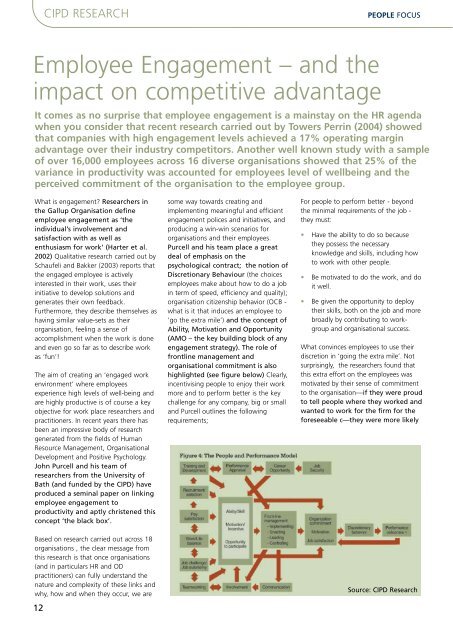PEOPLE FOCUS - CIPD
PEOPLE FOCUS - CIPD
PEOPLE FOCUS - CIPD
- TAGS
- people
- focus
- cipd
- www.cipd.co.uk
Create successful ePaper yourself
Turn your PDF publications into a flip-book with our unique Google optimized e-Paper software.
<strong>CIPD</strong> RESEARCH <strong>PEOPLE</strong> <strong>FOCUS</strong><br />
Employee Engagement – and the<br />
impact on competitive advantage<br />
It comes as no surprise that employee engagement is a mainstay on the HR agenda<br />
when you consider that recent research carried out by Towers Perrin (2004) showed<br />
that companies with high engagement levels achieved a 17% operating margin<br />
advantage over their industry competitors. Another well known study with a sample<br />
of over 16,000 employees across 16 diverse organisations showed that 25% of the<br />
variance in productivity was accounted for employees level of wellbeing and the<br />
perceived commitment of the organisation to the employee group.<br />
What is engagement? Researchers in<br />
the Gallup Organisation define<br />
employee engagement as ‘the<br />
individual’s involvement and<br />
satisfaction with as well as<br />
enthusiasm for work’ (Harter et al.<br />
2002) Qualitative research carried out by<br />
Schaufeli and Bakker (2003) reports that<br />
the engaged employee is actively<br />
interested in their work, uses their<br />
initiative to develop solutions and<br />
generates their own feedback.<br />
Furthermore, they describe themselves as<br />
having similar value-sets as their<br />
organisation, feeling a sense of<br />
accomplishment when the work is done<br />
and even go so far as to describe work<br />
as ‘fun’!<br />
The aim of creating an ‘engaged work<br />
environment’ where employees<br />
experience high levels of well-being and<br />
are highly productive is of course a key<br />
objective for work place researchers and<br />
practitioners. In recent years there has<br />
been an impressive body of research<br />
generated from the fields of Human<br />
Resource Management, Organisational<br />
Development and Positive Psychology.<br />
John Purcell and his team of<br />
researchers from the University of<br />
Bath (and funded by the <strong>CIPD</strong>) have<br />
produced a seminal paper on linking<br />
employee engagement to<br />
productivity and aptly christened this<br />
concept ‘the black box’.<br />
Based on research carried out across 18<br />
organisations , the clear message from<br />
this research is that once organisations<br />
(and in particulars HR and OD<br />
practitioners) can fully understand the<br />
nature and complexity of these links and<br />
why, how and when they occur, we are<br />
12<br />
some way towards creating and<br />
implementing meaningful and efficient<br />
engagement polices and initiatives, and<br />
producing a win-win scenarios for<br />
organisations and their employees.<br />
Purcell and his team place a great<br />
deal of emphasis on the<br />
psychological contract; the notion of<br />
Discretionary Behaviour (the choices<br />
employees make about how to do a job<br />
in term of speed, efficiency and quality);<br />
organisation citizenship behavior (OCB -<br />
what is it that induces an employee to<br />
‘go the extra mile’) and the concept of<br />
Ability, Motivation and Opportunity<br />
(AMO – the key building block of any<br />
engagement strategy). The role of<br />
frontline management and<br />
organisational commitment is also<br />
highlighted (see figure below) Clearly,<br />
incentivising people to enjoy their work<br />
more and to perform better is the key<br />
challenge for any company, big or small<br />
and Purcell outlines the following<br />
requirements;<br />
For people to perform better - beyond<br />
the minimal requirements of the job -<br />
they must:<br />
• Have the ability to do so because<br />
they possess the necessary<br />
knowledge and skills, including how<br />
to work with other people.<br />
• Be motivated to do the work, and do<br />
it well.<br />
• Be given the opportunity to deploy<br />
their skills, both on the job and more<br />
broadly by contributing to workgroup<br />
and organisational success.<br />
What convinces employees to use their<br />
discretion in ‘going the extra mile’. Not<br />
surprisingly, the researchers found that<br />
this extra effort on the employees was<br />
motivated by their sense of commitment<br />
to the organisation—if they were proud<br />
to tell people where they worked and<br />
wanted to work for the firm for the<br />
foreseeable c—they were more likely<br />
Source: <strong>CIPD</strong> Research

















